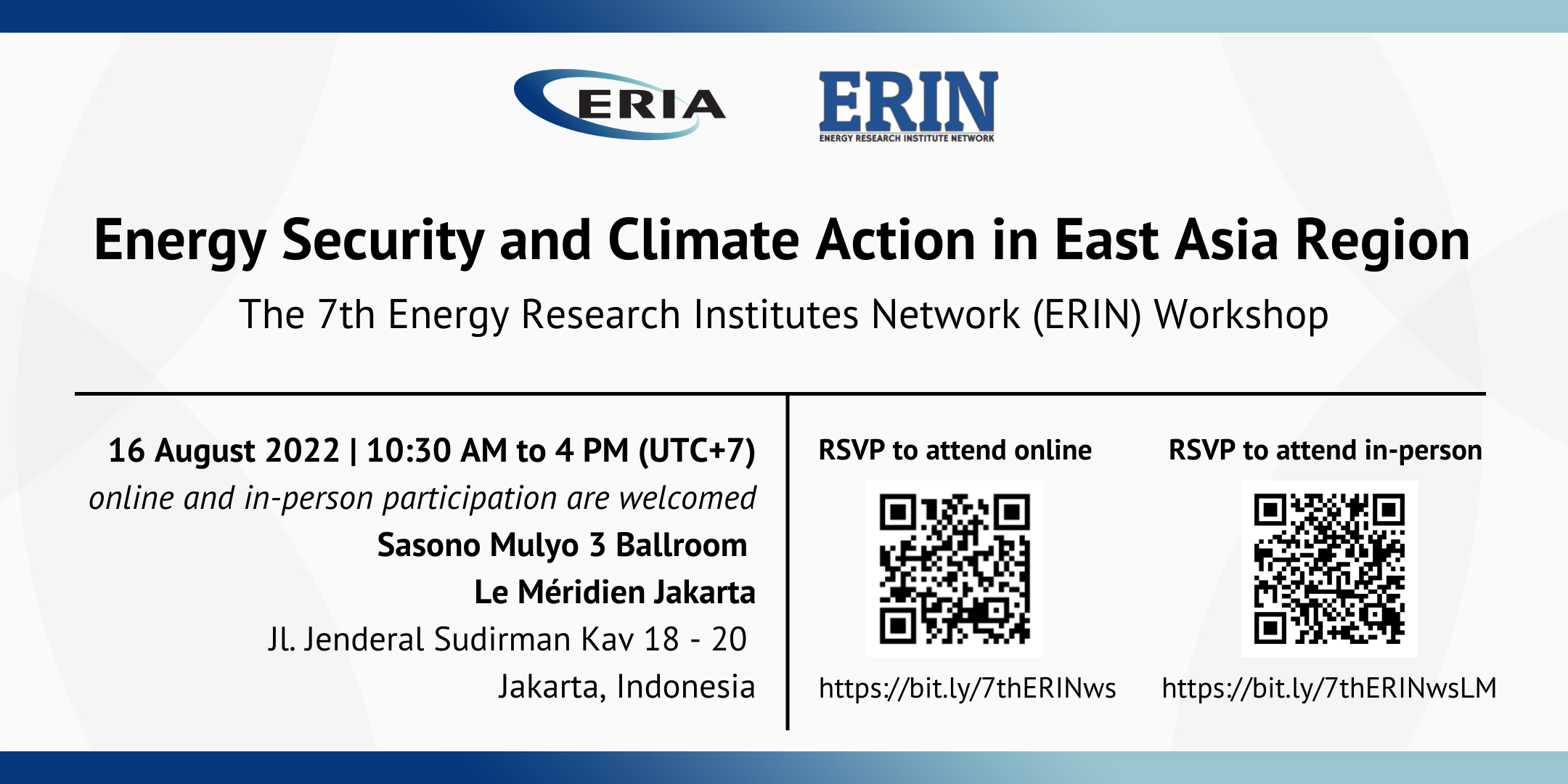Energy landscape has significantly changed since the conflict between Russia and Ukraine. Prior to the conflict, climate action was at the center of energy debate in which discussions centered on how to increase renewable energy and, conversely, reduce the use of fossil fuels. However, with energy prices further escalating due to the conflict and growing concerns about physical oil and natural gas supply shortages, interest in energy security has rapidly increased. Investments in fossil fuels are essential to resolving the ongoing energy security crisis, and it is obviously contradicted with long-term climate action. Thus, the world faces the difficult challenge of how to deal with strengthening fossil-based energy security while at the same time taking step to combat climate change. Addressing this issue is essential for the economic growth of Asian countries. In this workshop, we will invite experts from Asia and other regions to discuss this issue from multiple perspectives.
Event Details
Date: Tuesday, 16 August 2022
Time: 10 AM - 4 PM (Jakarta time, UTC+7)
Hybrid event, open for online and in-person participation
Offline seats are very limited, register soon to secure your seat
Venue: Sasono Mulyo 3 Ballroom, Le Méridien Jakarta
RSVP
Agenda
10:00 AM - 10:30 AM Registration
10:30 AM – 10:45 AM Opening Session
Opening Remark
Prof Tutuka Ariadji, Director General, Directorate General of Oil and Gas, Minister of Energy and Mineral Resources (MEMR), IndonesiA
Prof Hidetoshi Nishimura, President of ERIA
Welcome Remark
Dr Siti Indati binti Mustapa, Director of Institute of Energy Policy and Research, Universiti Tenaga Nasional (UNITEN), Malaysia [Co-Chairperson of ERIN]
10:45 AM – 11:15 AM Special Keynote Speeches:
Ukraine Crisis and Indispensable Cooperation in Asia
Prof Masakazu Toyoda, Senior Advisor (Former Chairman and CEO), The Institute of Energy Economics, Japan (IEEJ), Japan
Report of G20 Indonesian Presidency on Energy Transition Working Group
Mr Yudo Dwinanda Priaadi, Chairman of the G20 Energy Transition Working Group - Expert Staff to the Minister of Energy and Mineral Resources, Indonesia (TBC)
PHOTO SESSION
11:15 AM – 12:15 PM Session 1: Implication of Russia-Ukraine Conflict on Short- to Mid-Term Energy Security
Moderated by:
Prof Basil M. H. Sharp, Professor, Chair in Energy Economics, Department of Economics, Faculty of Business and Economics, The University of Auckland (UoA)
Panelists:
Present Situation of Impact and Trends in Policies
Mr Keisuke Sadamori, Director, Energy Markets and Security, International Energy Agency (IEA)
Uneasiness of Importing Countries, Pursuing for Low Prices, and LNG Import has challenged
Mr Michael O. Sinocruz, OIC-Director, Energy Policy and Planning Bureau, Department of Energy (DOE), Philippines
Exploring Alternatives to Russian Crude Oil and LNG
Dr Woongtae Chung, Director of International Cooperation Research Center, Korea Energy Economics Institute (KEEI), Republic of Korea (TBC)
Potential for increasing Export of LNG and Crude Oil
Mr Lucian Pugliaresi, President, Energy Policy Research Foundation (EPRINC), United States
Key questions
Impact of the Russia-Ukraine conflicts on the current and projected energy situation.
How will the Russia-Ukraine conflict influence energy security concerns in the EAS region? Are there any changes in energy strategies responding to the conflict? What are the pragmatic short- to mid-term strategies for EAS countries?
12:15 PM – 1:15 PM Lunch Break
1:15 PM – 2:00 PM Session 2: Aligning Climate Action with Energy Security in EAS Region
Moderated by:
Dr Asclepias Rachmi Soerjono Indriyanto, Chairperson of Executive Board, Indonesian Institute for Energy Economics (IIEE), Indonesia [ERIN Member]
Panelists:
Low Carbonization of Coal-fired Power Plants, and Need for Low-cost Gas
Mr A. K. Saxena, Senior Fellow and Senior Director of Electricity and Fuels Division, The Energy and Resources Institute (TERI), India (Alternate ERIN Member)
Balanced Energy Policies including EE&C
Department of Alternative Energy development (DEDE), Ministry of Energy (MOEN), Thailand (TBC)
Hydrogen Export and Supply Chain
Ms Rebecca Thomson, Hydrogen Strategy Team, Department of Industry, Science, Energy and Resources (DISER), Australia
Decarbonization Path based on Actual Situation of ASEAN Countries, and Results of AETI
Dr Han Phoumin, Senior Energy Economist, Energy Unit, Research Department, ERIA
Key questions
Integrated strategies for energy security and climate protection.
What are the accessible and affordable options for EAS countries both in terms of energy security and GHG mitigation? What kind of investment will be required along the time horizon?
2:15 PM – 2:45 PM Break
2:45 PM – 3:45 PM Session 3: Necessary Policies and Initiatives for Energy Security and Climate Action in EAS Region
Moderated by:
Dr Siti Indati binti Mustapa, Director of Institute of Energy Policy and Research, Universiti Tenaga Nasional (UNITEN), Malaysia [Co-Chairperson of ERIN]
Background and Objectives of Session 3
Mr Tatsuya Terazawa, Chairman and CEO, The Institute of Energy Economics, Japan (IEEJ), Japan [ERIN Member]
Panelists:
Needs of Asian Developing Countries, and Necessity of Investment to Fossil Energy
Dr Djoko Siswanto, Secretary General, National Energy Council (NEC), Indonesia
Needs of Asian Developing Countries, and Necessity of Investment to Fossil Energy
H.E. Mr Victor Jona, Under Secretary of State, Ministry of Mines and Energy (MME), Cambodia [ERIN Member]
Role of Financial Institution
Mr Florian Kitt, Senior Energy Specialist, Southeast Asia Department, Asia Development Bank (ADB)
Key questions
Gap between the demand for hasty decarbonization and the reality in Asia. What gaps exist? Is investment in fossil energy unnecessary? What policies or initiatives are needed for Asia to address both energy security and GHG mitigation, including in investment and financing?
3:45 PM- 4:00 PM Closing Remarks
Mr Koji Hachiyama, Chief Operating Officer, Director General of Administration, Personnel, & Outreach Departments, ERIA

